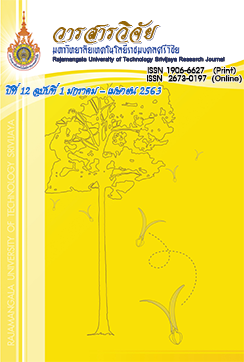The Development of Causal Relationship Model of Knowledge Management and Professional Skills Affecting to Potential of Accountant in Digital Economy
Keywords:
knowledge management, accounting professional skills, digital economyAbstract
The purposes of this research are to (1) study direct and indirect the influence of knowledge management and professional accounting skills on accountants’ competencies in the digital economy era, and (2) investigate the congruence of casual relationship model of knowledge management, professional accounting skills and competencies of professional accountants that influence the competencies of accountants in the digital economy era. The model created consists of 3 latent variables and 13 observed variables. Quantitative data were collected from the sample group which were 320 accountants who work in accounting offices in Bangkok and Nonthaburi. They were selected based on simple sampling method. The instruments used were five-point rating scale questionnaires. The data were analyzed by using descriptive statistics and structure equation model of influence analysis. The results showed that a causal relationship model of important factors affecting the competencies factor of accountants in the digital economy era of key competencies factors, management competencies and technical competencies were consistent with empirical data Chi-square/df=1.708; GFI=0.965; AGFI=0.934; RMSEA=0.047; SRMR=0.014.
The results also showed that knowledge management and professional accounting skills directly influenced accountants’ competencies in positive direction with statistical significance at the level of .01 and with the path coefficient equal to 1.28. It was directly influenced by the causal factors of accountants’ knowledge management with direct effect in the negative direction with statistical significance at the level of .01 and with the path coefficient equal to -0.42. Additionally, it was found that the performance of accountants were indirectly influenced by knowledge management through accounting professional skills with a coefficient is 0.758.
References
กัลยา วานิชย์บัญชา. 2556. การวิเคราะห์สมการโครงสร้าง (SEM) ด้วย AMOS. สามลดา, กรุงเทพฯ.
จุไรรัตน์ ศรีสัตตรัตน์ และ สมยศ อวเกียรติ. 2560. ปัจจัยเชิงสาเหตุของนักบัญชีที่ส่งผลต่อความสำเร็จด้านบัญชีของวิสาหกิจขนาดกลางและขนาดย่อมในการนิคมอุตสาหกรรมแห่งประเทศไทย เขตภาคกลาง. วารสารวิชาการมหาวิทยาลัยธนบุรี 11(25): 137-152.
บัญชี: Special : Bluefish. 2560. ปรับมุมคิด สู่การเป็นนักบัญชีดิจิทัล. CPD&ACCOUNT 14(164): 7-8.
ปรียาณัฐ เอี๊ยบศิริเมธี, นิภาพรรณ ดุลนีย์ และ สุพัตรา หารัญดา. 2559. ความคิดเห็นของผู้จัดทำบัญชีที่มีต่อสมรรถนะวิชาชีพบัญชีเมื่อเปิดเสรีทางการค้าในจังหวัดนครราชสีมา. วารสารวิทยาลัยนครราชสีมา 10(1): 71-82.
พิธุวรรณ กิตติคุณ. 2559. ภาครัฐไทยกับการก้าวสู่รัฐบาลดิจิทัล. แหล่งที่มา: http://www.parliament.go.th/library, 12 มกราคม 2561.
พูลสิน กลิ่นประทุม. 2559. ความสัมพันธ์ระหว่างทักษะทางวิชาชีพกับความสำเร็จในการทำงานของอาจารย์ผู้สอนวิชาการบัญชีในมหาวิทยาลัยเทคโนโลยีราชมงคล. วารสารปัญญาภิวัฒน์ 8(1): 137-149.
ศิริรัฐ โชติเวชการ. 2561. การพัฒนาของระบบบัญชีคอมพิวเตอร์ที่น่าจับตามอง. แหล่งที่มา: http://fap.or.th/upload/9414/OGI4 NUmTs.pdf, 12 เมษายน 2561.
สมชาย เลิศภิรมย์สุข, พยอม วงศ์สารศรี และ อังคณา นุตยกุล. 2556. แนวทางการพัฒนาองค์กรแห่งการเรียนรู้ของวิชาชีพบัญชีในประเทศไทย. วารสารวิชาการมหาวิทยาลัยธนบุรี 7(13): 65-78.
อติพร เกิดเรือง. 2559. การส่งเสริมการเรียนรู้ในศตวรรษที่ 21 เพื่อรองรับสังคมไทยในยุคดิจิทัล. วารสารวิชาการ มหาวิทยาลัยราชภัฏลำปาง 6(1): 173-184.
Boam, R. and Sparrow, P. 2008. Designing and Achieving Competency: A Competency-Based Approachto Developing People and Organization. McGraw-Hill, Berkshire, England.
Boyatzis, R.E. 2002. The Competent Manager: A Model for Effective Performance. John Wiley & Sons, New York.
Camuffo, A. and Gerli, F. 2005. The Competent Production Supervisor: A Model for EffectivePerformance. Available Source: http://web.mit.edu/ipc/publication/pdf/05-002.pdf, April 12, 2018.
Hair, J.F., Black, B., Babi, B., Anderson, R.E. and Tatham, R.L. 2006. Multivariate Data Analysis (6th ed). Pearson/Prentice-Hall, Upper Saddle River, NJ.
Spencer, L.M. and Spencer, S.M. 1993. Competency at Work: Model for Superior Performance. John Wiley & Sons, New York.
Downloads
Published
How to Cite
Issue
Section
License
The content and information in the article published in Journal of Rajamangala University of Technology Srivijaya It is the opinion and responsibility of the author of the article. The editorial journals do not need to agree. Or share any responsibility.







